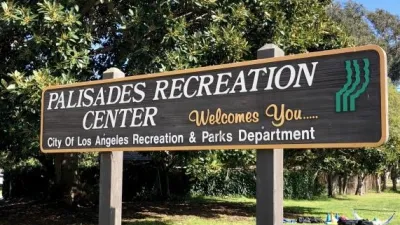After a tour of Los Angeles street furniture, Alissa Walker offers her reflections on cities' changing approach to public space.
"Thanks to some smart approaches to the way our streets are being redesigned, cities are slowly moving beyond the 'have a seat, but not for too long' mentality," writes Alissa Walker for Curbed. That mentality includes the "defensive" architecture and design that particularly targets homeless people.
Although homelessness has increasing consideration state- and nationwide, Walker posits that L.A.'s new generation of street furniture comes as a response to renewed interest in bike and pedestrian infrastructure. She writes:
This means a whole new way of thinking about how people can enjoy these spaces. Goodbye to bolted, cement-slathered seating; hello to lightweight benches, moveable planters, beach umbrellas, and cheap cafe tables and chairs—all of which can be repositioned by users.
The lightweight, "nimble" pieces reflect an approach to streetscape improvement where low-capital projects that can be easily altered or removed based on their success:
The parklets and plazas that are starting to pop up on urban streets are often pilot projects—tiny street corners carved out with temporary decking materials or, in some cases, just a different color of paint... "We like to collect data to learn from the projects and actually tweak them to evolve them," says Valerie Watson, LADOT’s assistant pedestrian coordinator.
Walker also notes that these projects are often implemented and maintained through public-private partnerships, allowing innovations like smart furniture to be sited more equitably throughout neighborhoods.
Walker notes that these projects are often done through public-private partnerships, which can allow innovations like smart furniture to be sited more equitably throughout neighborhood—although recently, a failed partnership cost Los Angeles more than 800 bus shelters throughout the city.
FULL STORY: Seats in the street: How LA's outdoor furniture creates a more livable city

Planetizen Federal Action Tracker
A weekly monitor of how Trump’s orders and actions are impacting planners and planning in America.

Chicago’s Ghost Rails
Just beneath the surface of the modern city lie the remnants of its expansive early 20th-century streetcar system.

San Antonio and Austin are Fusing Into one Massive Megaregion
The region spanning the two central Texas cities is growing fast, posing challenges for local infrastructure and water supplies.

Since Zion's Shuttles Went Electric “The Smog is Gone”
Visitors to Zion National Park can enjoy the canyon via the nation’s first fully electric park shuttle system.

Trump Distributing DOT Safety Funds at 1/10 Rate of Biden
Funds for Safe Streets and other transportation safety and equity programs are being held up by administrative reviews and conflicts with the Trump administration’s priorities.

German Cities Subsidize Taxis for Women Amid Wave of Violence
Free or low-cost taxi rides can help women navigate cities more safely, but critics say the programs don't address the root causes of violence against women.
Urban Design for Planners 1: Software Tools
This six-course series explores essential urban design concepts using open source software and equips planners with the tools they need to participate fully in the urban design process.
Planning for Universal Design
Learn the tools for implementing Universal Design in planning regulations.
planning NEXT
Appalachian Highlands Housing Partners
Mpact (founded as Rail~Volution)
City of Camden Redevelopment Agency
City of Astoria
City of Portland
City of Laramie





























